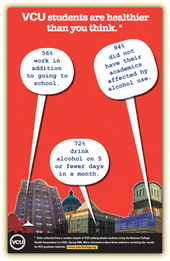By: M. Dolores Cimini, PhD, University at Albany, SUNY
We know from the research literature on college student alcohol use that target populations such as first-year students, student-athletes, fraternity and sorority members, students mandated for alcohol policy violations, and students seeking health and counseling care for concerns unrelated to their alcohol use are often at highest risk for alcohol abuse and related negative consequences…and they are less likely to seek intervention for these issues.
We also know that the research literature and best practice guidelines state unequivocally that engaging students in screening and brief intervention addressing their alcohol use is associated with reductions in consumption and related consequences as well as the increased use of protective behaviors.
We know from the research literature on college student alcohol use that target populations such as first-year students, student-athletes, fraternity and sorority members, students mandated for alcohol policy violations, and students seeking health and counseling care for concerns unrelated to their alcohol use are often at highest risk for alcohol abuse and related negative consequences…and they are less likely to seek intervention for these issues.
We also know that the research literature and best practice guidelines state unequivocally that engaging students in screening and brief intervention addressing their alcohol use is associated with reductions in consumption and related consequences as well as the increased use of protective behaviors.

Since 2006, UAlbany’s STEPS Comprehensive Alcohol Screening and Brief Intervention Program, based on the BASICS model and designed to meet the distinct and complex needs of different kinds of students, has been delivering personalized feedback on alcohol use to each student who participates.
Some examples:
We are currently collecting data on the newest arm of our STEPS program designed for our fraternity and sorority members; here, we are focusing on factors such as alcohol use and fraternity and sorority reputation as well as the role of alcohol use in fraternity and sorority rituals.
In the same way that we have worked to engage our students in alcohol screening and brief intervention, we have learned that it’s important to engage stakeholders, including service providers, coaches, advisors, first-year experience staff members, and faculty members, in the planning process and keep them informed of successes and challenges. Our stakeholders often underestimate their role in making a screening and brief intervention program successful, and they are always quite surprised and impressed to learn of the impact they have on our students.
By 2009, when the program received the ACHA Best Practices in College Health Award, the program had reached more than 13,000 students. Four years later, our efforts are continuing to work: with more than 21,000 students screened for alcohol use to date, we have seen statistically significant reductions in alcohol use and associated negative consequences across each target population.
Perhaps even more importantly, our students are providing positive feedback on the interventions. They appreciate how easily they can access and resonate with the issues that are on their minds.
Some examples:
- Student-athletes are screened after team meetings, receiving information on alcohol use and athletic performance in their feedback profiles.
- First-year students participate in online screening within the first month of college, followed by a brief intervention that focuses on alcohol use as it relates to college adjustment.
We are currently collecting data on the newest arm of our STEPS program designed for our fraternity and sorority members; here, we are focusing on factors such as alcohol use and fraternity and sorority reputation as well as the role of alcohol use in fraternity and sorority rituals.
In the same way that we have worked to engage our students in alcohol screening and brief intervention, we have learned that it’s important to engage stakeholders, including service providers, coaches, advisors, first-year experience staff members, and faculty members, in the planning process and keep them informed of successes and challenges. Our stakeholders often underestimate their role in making a screening and brief intervention program successful, and they are always quite surprised and impressed to learn of the impact they have on our students.
By 2009, when the program received the ACHA Best Practices in College Health Award, the program had reached more than 13,000 students. Four years later, our efforts are continuing to work: with more than 21,000 students screened for alcohol use to date, we have seen statistically significant reductions in alcohol use and associated negative consequences across each target population.
Perhaps even more importantly, our students are providing positive feedback on the interventions. They appreciate how easily they can access and resonate with the issues that are on their minds.

 RSS Feed
RSS Feed